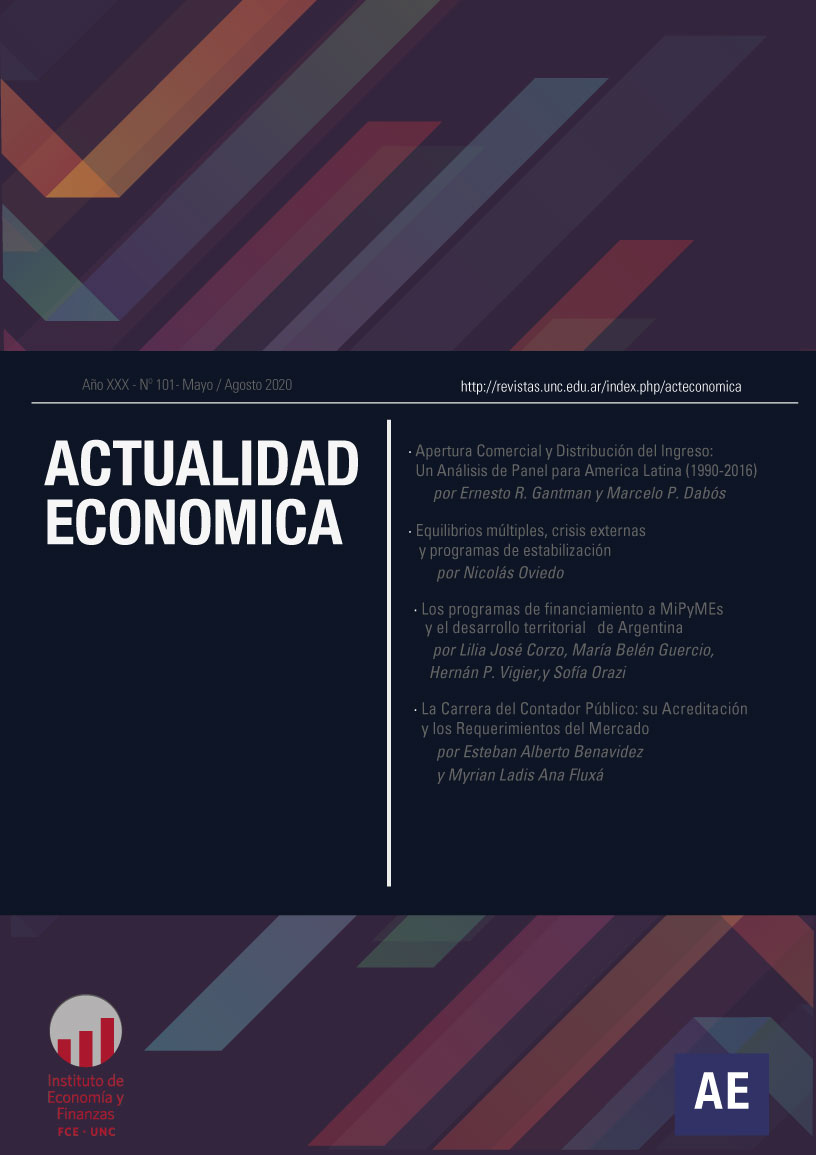Equilibrios múltiples, crisis externas y programas de estabilización
Palabras clave:
equilibrios múltiples, balanza de pagos, crisis externaResumen
En este artículo, discutimos la idea de que los programas de estabilización que fracasan o el estallido de crisis externas son la desembocadura de una trayectoria macroeconómica unívocamente determinada. Para ello, apelamos a la noción teórica de equilibrio múltiple y a un breve repaso de las lecciones aprendidas en experiencias latinoamericanas de estabilización. Los desequilibrios en las cuentas externas, la acumulación de deuda en moneda extranjera y la fragilidad financiera en general pueden poner a una economía en situación de multiplicidad de equilibrios. El resultado que se concrete dependerá de las expectativas de ciertos agentes, del advenimiento de shocks o bien de la realización o no de eventos aleatorios que coordinen conductas. Los modelos de crisis de balanzas de pagos de segunda generación reflejan formalmente nuestro argumento.
Descargas
Referencias
Baxter, M. (1985). The role of expectations in stabilization policy. Journal of Monetary Economics, 15(3), 343-362.
Bratsiotis, G., & Robinson, W. (2004). Economic fundamentals and self-fulfilling crises: Further evidence from Mexico. Journal of International Money and Finance, 23(4), 595-613.
Burnside, C., Eichenbaum, M., & Rebelo, S. (2004). Government Guarantees And Self-Fulfilling Speculative Attacks. Journal of Economic Theory, 119(1), 31-63.
Calvo, G. (1995). Varieties of Capital-Market Crises. IDB Working Paper No. 250. Disponible en: http://dx.doi.org/10.2139/ssrn.1815934.
Calvo, G., & Végh, C. (1999). Inflation Stabilization and BOP Crises in Developing Countries. En Taylor, J., & Woodford, M. (editores), Handbook of Macroeconomics (págs. 1531-1614). Cambridge: Elsevier Science.
Cole, H., & Kehoe, T. (1996). A self-fulfilling model of Mexico's 1994–1995 debt crisis. Journal of International Economics, 41(3-4), 309-330.
Cole, H., & Kehoe, T. (2000). Self-Fulfilling Debt Crises. The Review of Economic Studies, 67(1), 91-116.
Dornbusch, R. (1991). Credibility and Stabilization. The Quarterly Journal of Economics, 106(3), 837-850.
Flood, R., & Marion, N. (1996). Speculative Attacks: Fundamentals and Self-Fulfilling Prophecies. NBER Working Paper No. 5789. Disponible en: http://www.nber.org/papers/w5789.
Frenkel, R. (1986). Salarios e inflación en América Latina. Desarrollo Económico, 25(100), 587-622.
Frenkel, R. (2013). Lessons from a Comparative Analysis of Financial Crises. Comparative Economic Studies, 55(3), 405-430.
Gourinchas, P. O., Valdes, R., & Landerretche, O. (2001). Lending Booms: Latin America and the World. NBER Working Paper No. 8249. Disponible en http://www.nber.org/papers/w8249.
Guidotti, P., & Végh, C. (1999). Losing Credibility: The Stabilization Blues. International Economic Review, 40(1), 23-51.
Krugman, P. (1979). A Model of Balance-of-Payments Crises. Journal of Money, Credit and Banking, 11(3), 311-325.
Krugman, P. (1996). Are Currency Crises Self-Fulfilling? En NBER Macroeconomics Annual, 11, 345-407.
Martínez Peria, M. S. (1998). Understanding Devaluations in Latin America: A "Bad Fundamentals" Approach. International Finance 9805004, University Library of
Munich. Disponible en: https://econwpa.ub.uni-muenchen.de/econ-wp/if/papers/9805/9805004.pdf.
Obstfeld, M. (1986). Rational and self-fulfilling balance-of-payments crises. The American Economic Review, 76(1), 72-81.
Obstfeld, M. (1996). Models of Currency Crises With Self-fulfilling Features. European Economic Review, 40(3-5), 1037-1047.
Radelet, S., & Sachs, J. (1998). The East Asian Financial Crisis: Diagnosis, Remedies, Prospects. Brookings Paper, 28(1), 1-74.
Rapetti, M., & Frenkel, R. (2009). A developing country view of the current global crisis. Cambridge Journal of Economics, 33(4), 685-702.
Rapetti, M., & Frenkel, R. (2010). A Concise History of Exchange Rate Regimes in Latin America. University of Massachusetts Amherst, Economics Department Working Paper Series No. 97. Disponible en: https://scholarworks.umass.edu/econ_workingpaper/97
Ray, D. (1998). Economía del desarrollo. Antoni Bosch.
Rizvi, S. A. (2006). The Sonnenschein-Mantel-Debreu Results after Thirty Years. History of Political Economy, 38(1), 228-245.
Sargent, T., & Wallace, N. (1981). Some Unpleasant Monetarist Arithmetic. Quaterly Review - Federal Reserve of Minneapolis, 5(3), 1-17.
Talvi, E. (1996). Exchange-Rate-Based Stabilization with Endogenous Fiscal Response. IDB Working Paper No. 268. Disponible en: http://dx.doi.org/10.2139/ssrn.1815954.
Descargas
Publicado
Número
Sección
Licencia

Esta obra está bajo una licencia internacional Creative Commons Atribución-NoComercial-SinDerivadas 4.0.
Aquellos autores/as que tengan publicaciones con esta revista, aceptan los términos siguientes:
- Los autores/as conservarán sus derechos de autor y garantizarán a la revista el derecho de primera publicación de su obra, el cuál estará simultáneamente sujeto a la Licencia Creative Commons Atribución-NoComercial-SinDerivar 4.0 Internacional que permite a terceros compartir la obra siempre que se indique su autor y su primera publicación esta revista.
- Los autores/as podrán adoptar otros acuerdos de licencia no exclusiva de distribución de la versión de la obra publicada (p. ej.: depositarla en un archivo telemático institucional o publicarla en un volumen monográfico) siempre que se indique la publicación inicial en esta revista.
- Se permite y recomienda a los autores/as difundir su obra a través de Internet (p. ej.: en archivos telemáticos institucionales o en su página web) antes y durante el proceso de envío, lo cual puede producir intercambios interesantes y aumentar las citas de la obra publicada. (Véase El efecto del acceso abierto)









